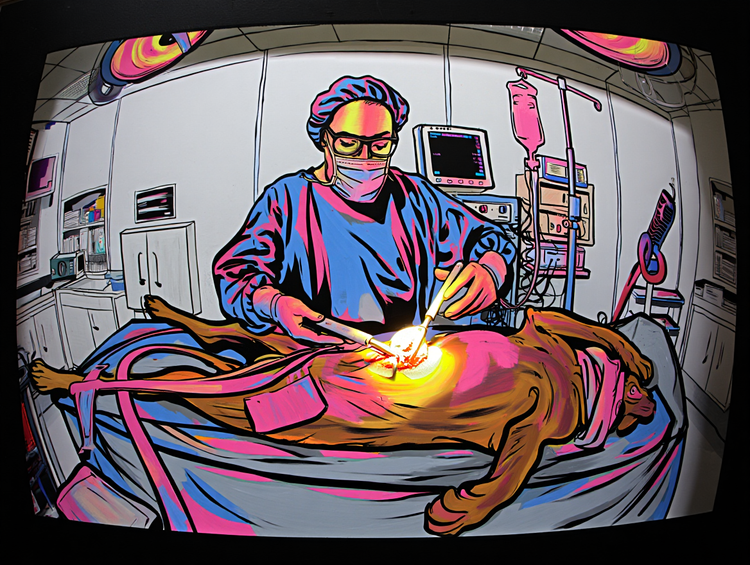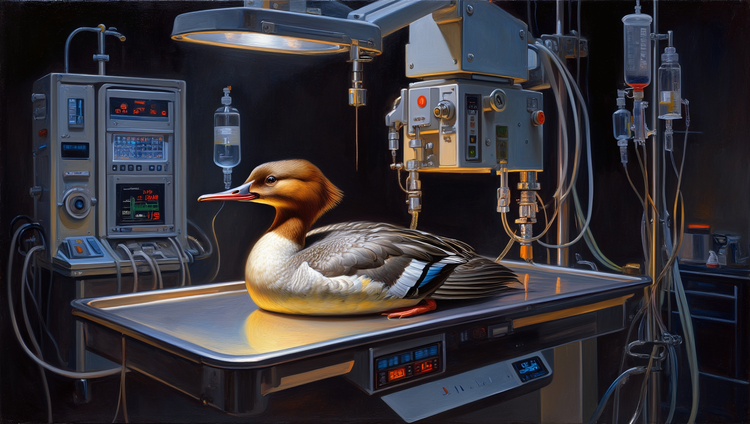Time Crunch

I was about 20 yards away from the lobby doors, walking briskly down the hallway from the treatment area. I couldn't run, that would appear disorderly, but my footsteps were about as quick as appearances would allow. I closed the distance and whipped my mind into super communication mode. Someone was waiting for me in the lobby, and they were about to get rolled by what I needed to tell them.
I need to be confident, clear, and concise. In less than 60 seconds.
Per the "official" veterinary guidelines, when an animal dies in my care, I'm supposed to explain what CPR is, get across a sense of the potential outcomes, estimate a cost that won't offend anyone, and make sure the owner has a feeling of complete control over their decision to either provide or withhold CPR. And do it, ideally, in less than one minute.
Time is of the essence during CPR, any number of things might happen quickly. Adrenaline and cortisol levels spike. Orders are shouted, and shaky hands attempt one-shot-or-catastrophic-failure procedures. In the lobby, I'll ask a complete stranger to make one of the hardest decisions of their life. And, if the odds hold, my patient won't leave the hospital alive.
The entire treatment staff is currently performing CPR. The dog just died, or is in the process of dying. The clock began ticking no more than fifteen seconds ago, when a nurse flagged the patient's status for me. A moment later, his limp body is on the table and he's getting chest compressions 120 times a minute. Everyone drops what they're doing when a code is called.
The team is prepared and well drilled, so I head off to make contact with the little dog's owner. I need a decision from them right away: keep going or stop. It's that simple. Calmly and compassionately, I have a minute to get their consent. Do you want to gamble hundreds of dollars on a long-shot that most likely will prolong your poor animal's suffering?
Yes or no?
It's an impossible task. My mind is split. One half listens patiently to the owner, reading her face intensely for any signal of understanding the heartbreaking truth she's hearing. The other half is coldly calculating the situation back in the treatment area. How long has it been? I should check to see if there's been any luck, but my inner cynic just shakes his head. This animal is either dying or dead, and no amount of flipping back and forth between the two states like Schrödinger's cat is going to change my mind about the most likely outcome. An entire team of people is working frantically to perform emergency procedures. Treatments for the other animals in the hospital have been paused. As far as anyone behind those doors is concerned, time has stopped.
But in the lobby, each second passes like a sledgehammer. I know the ugliness of CPR. I know how expensive this can be. I know public trust in veterinarians is eroding as we get more expensive. I know corporate marketing has over-promised and under-delivered on the miracle of modern veterinary medicine. Success is pure illusion in this case. Who are we helping?
The dog's owner doesn't know any of this. She walked in just a few minutes ago, not even for an emergency. Her sweet little dog was here for a heart screening, to check his health before anesthesia for some dental care. Her vet had picked up the heart murmur and referred her to the specialty clinic. All in a timely fashion too, the dog didn't feel sick at all. He was even wagging his tail when he walked in.
Things have changed quite a bit. I need her trust, and I don't have a lot of time. She can't decide, so I head back into the treatment area and make eye contact with my colleague. He just shakes his head. Everyone looks at me, but the default is to keep going, so they do. I put my hands on the patient, it's hard to know exactly when it slips away. Sometimes signs of death are ambiguous. I don't think the ultimate outcome has changed.
The state between is agony. I'd love for this to all be over. I'd love to release everyone from this state of hopeful tension that I'm pretty sure is hopeless. I go back to the lobby to try again. I'd like to see a needle shift from desperate resistance to peaceful eventuality. What we're doing now is not success, it's failure! I furiously wrestle with the dial of persuasion. Let's end this. All I need is the answer to a yes or no question!!!
Hey– chill out. This is a partnership. This woman– your client– needs you right now. She needs you to be patient. This is your home turf. Stay in control. You didn't hit your 60 second target, but there's still time. Talk to her. Explain it again. Don't expect a lifetime of movies and television-trained emergency preparedness to be overturned so quickly. This is your job. Be a grown up. People are counting on you.
It's so human to complicate these situations. To create a story of blame, and irresponsibility, and fouling the pot through willful ignorance. But a deep breath at the right time almost always leads to success. The next few minutes pass by more indistinctly. Maybe we went through several two-minute cycles, I can't exactly remember.
But eventually, the owner and I agree. It's time to let go. Stop.
I project my voice to the back of the treatment room as soon as I hear the door latch, and the flurry of activity sputters to a halt. Relaxation washes in.
I confirm the absence of a heartbeat in the little body and my nervous system exhales. I look calmly at the dead dog, it can no longer feel any pain. Something about his sweet expression gives me relief. I am certain that he had never worried about this moment. That his friendly little mind only desired proximity to his family. It had never troubled itself about mortality. He wanted to live, and fought for life until his end, but he had never been troubled by this moment before. Overall– if he could reflect on it– it had been a pretty good life. He was more than happy to have spent it with these people. He had died without regrets, as all dogs do.
He had never worried about running out of time.





Comments ()